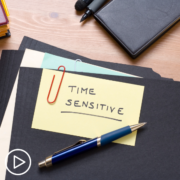Understanding Small Cell Lung Cancer Research News and Future Treatments
Understanding Small Cell Lung Cancer Research News and Future Treatments from Patient Empowerment Network on Vimeo.
What do small cell lung cancer (SCLC) treatment and the future of treatment look like? Expert Dr. Vinicius Ernani from the Mayo Clinic discusses SCLC treatment progress and small cell lung cancer clinical trials including the DeLLphi trial.
[ACT]IVATION TIP
“I think stay tuned. This tarlatamab might become, down the road, a new standard of care for our patients.”
See More from [ACT]IVATED Small Cell Lung Cancer (SCLC)
Related Resources:

|

|

Advice for Small Cell Lung Cancer Patients Considering Clinical Trials |
Transcript:
Lisa Hatfield:
And, Dr. Ernani, can you please explain research advancements in immuno-oncology and what this means for extensive-stage small cell lung cancer patients? And how do you envision the treatment landscape evolving over the next five to 10 years?
Dr. Vinicius Ernani:
Yes. So over the last 30 years, we’ve had multiple Phase II, Phase III trials and, unfortunately, we were not able to move the needle in small cell lung cancer. However, over the last few years with the advancement of immunotherapy and incorporating immunotherapy to the standard carboplatin (Paraplatin) and etoposide (Toposar), we were able to finally make some progress in small cell lung cancer.
So now we know that the standard of care is to give chemotherapy plus immunotherapy, and we have at least three to four randomized Phase III trials showing the benefit of adding immunotherapy to chemotherapy. And I think this is a very exciting time for small cell. We are seeing at least over the last couple of meetings, over the last year, I’ve been seeing at least two promising drugs.
One is tarlatamab that was the Phase II studies called the DeLLphi trial, was recently presented at ESMO. And there’s also an antibody drug conjugate that has also been very promising in small cell. So we’ll see how these studies are going to play out, especially the antibody drug conjugate, that’s still a Phase I study. So it’s a little bit early, but encouraging response rates. And the tarlatamab, which is a BiTE, and what I mean by BiTE, is a bi T-cell specific engager. I think it’s probably going to be soon approved by the FDA, and I think it’s going to change the standard of care in small cell again.
Lisa Hatfield:
Dr. Ernani, with regard to the DeLLphi trial, can you explain who that is for and more specifically maybe what the hope is for patients and their families?
Dr. Vinicius Ernani:
Yeah. So the DeLLphi trial was a Phase II study. So usually we have three types of study, right? First, we have the Phase I study. Phase I studies are usually looking at how safe is a drug, but we are not looking too much of how active the drug is. We’re just making sure that the drug is safe to give to the patients. A Phase II study is a little bit bigger than a Phase I, and we are looking still at safety, if the treatment is safe, but we are trying to look a little bit more careful and how active this drug is.
In Phase III, those are usually big studies that randomizes 200, 300, 400 patients to the standard of care compared to the new drug. And that’s usually where we get the FDA approvals. So the DeLLphi-301 trial was a Phase II study that enrolled patients with heavily pretreated small cell lung cancer, extensive stage small cell lung cancer, to receive tarlatamab.
And they had two doses. It was 10 milligrams and 100 milligrams. And it seems that the 10 milligram cohort, that actually the responses were even better than the 100 milligrams. So we saw the presentation at ESMO, it was actually published in one of the most respected…probably the most respected journal of medicine, the New England Journal of Medicine, and there was a response rate of 40 percent. So if we could give tarlatamab for patients that fail at least two lines of treatment, the chances of them responding to tarlatamab is about 40 percent.
And more importantly, I think that the duration of response was greater than six months. So what I mean by that, more than 50 percent of the patients that received this drug, they controlled the cancer for at least six months. So I think that’s a very positive about this drug.
Lisa Hatfield:
Great, thank you. And then one follow-up question I have about that. So if a patient were to come to you or go to their local oncologist and say, I’m really interested, I heard about this DeLLphi trial or any clinical trial, what is the advice you would give to that patient on how to access that clinical trial?
Dr. Vinicius Ernani:
Well, unfortunately, we don’t have at our institution, what I usually help my patients, I go to clinicaltrials.gov and I type their cancer, and I go over with them on where the trials are open, and we try to find a facility or a cancer center that is close to where they live. So that’s what I usually do when I’m trying to find a clinical trial that I don’t have available in my site.
My activation tip for this question is, again, I think stay tuned. This tarlatamab might become, down the road, a new standard of care for our patients.
Share Your Feedback:
Create your own user feedback survey







